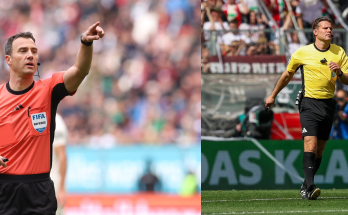The NFL is no stranger to controversy, but the latest suggestion from an ESPN commentator has sparked a fresh wave of debate across the sports world. During a recent segment on the network, the analyst passionately argued that the NFL should consider implementing a lottery system for its draft, similar to what the NBA uses, in order to curb what he called the “shameful” trend of tanking.
The commentator, whose remarks quickly went viral on social media, pulled no punches in his assessment. “It’s a disgrace,” he said bluntly. “Watching teams give up on an entire season for the chance to draft one player is not only bad for the fans, it’s bad for the game. We need a system that rewards effort, not manipulation.”
His sentiment isn’t exactly new. Tanking has long been a dirty little secret in the NFL, with fans and insiders alike speculating each year which teams might be subtly — or not so subtly — trying to lose games in order to secure a higher draft pick. The concept became particularly prominent during the 2011 season with the infamous “Suck for Luck” campaign, in which a number of fanbases openly rooted for their teams to lose in hopes of landing Stanford quarterback Andrew Luck. Since then, similar slogans and strategies have popped up in different variations almost every year.
Yet the issue seems to have grown more visible in recent seasons, with teams making roster decisions that appear strategically designed to lower their chances of winning late-season games. While coaches and general managers rarely admit to tanking outright, the evidence often speaks for itself — starting quarterbacks mysteriously benched, key veterans traded away, and play-calling that seems more conservative than usual.
The NFL has long defended its draft structure, in which the team with the worst record gets the first overall pick. In theory, it promotes parity by giving struggling franchises a chance to rebuild with top talent. But critics argue that it incentivizes losing, allowing organizations to exploit the system by fielding subpar teams in exchange for future rewards.
The ESPN commentator is now joining a growing chorus of voices who say enough is enough.
“Look at what the NBA did,” he said, referring to the league’s implementation of a lottery system that gives multiple teams a chance at the No. 1 pick. “They still have problems with teams tanking, sure, but at least there’s some uncertainty. At least you can’t guarantee that being the worst team gives you the best draft slot. That’s how it should be.”
The NBA’s lottery, while not without its own flaws, has been credited with reducing some of the more blatant forms of tanking. By introducing weighted odds and ping-pong balls to determine draft order, the league has tried to dissuade teams from intentionally losing games in order to secure the top pick. The result hasn’t been perfect, but it’s a step away from the guaranteed-reward system that still exists in the NFL.
Opponents of the NFL adopting a lottery argue that the sport is fundamentally different. With just 17 games in a regular season compared to the NBA’s 82, the impact of each game is magnified. Moreover, the physical toll of football makes it difficult to play at less than full effort — tanking, in this context, becomes more about front-office decisions than on-field performance. But even if the players aren’t tanking, the decisions made by coaches and executives can still set a team up to fail.
There’s also the issue of competitive balance. The NFL prides itself on being a league of parity, where any team can go from worst to first in a matter of seasons. That’s only possible, some argue, because of the current draft structure. A lottery system could theoretically make it harder for the very worst teams to dig themselves out of long-term struggles.
Yet the ESPN commentator isn’t buying it.
“If you’re truly committed to building a better team, you’ll do it the right way — through good scouting, smart trades, and development,” he said. “Not by tanking. That’s not strategy. That’s surrender.”
It’s a stance that has resonated with many fans, particularly those tired of watching their teams languish at the bottom of the standings while management appears to prioritize draft position over actual wins. In recent years, social media has given voice to frustrated supporters, some of whom openly call out their own organizations for what they perceive as deliberate sabotage.
“There’s nothing worse than buying a ticket to an NFL game and knowing your team doesn’t really care about winning that day,” one fan posted on X (formerly Twitter). “That’s not football. That’s fraud.”
Even within the league, there have been whispers of discomfort about the current system. Multiple executives have privately expressed concern about the optics of tanking, particularly in an era when sports betting is more prevalent than ever. If fans are wagering on games that teams aren’t fully trying to win, it creates a credibility problem for the league.
The potential for a lottery system, while not currently on the table officially, is certainly gaining traction in the court of public opinion. Some proposals have floated the idea of a “wheel” system, where draft order rotates on a multi-year cycle regardless of record. Others have suggested more modest tweaks, like only awarding the No. 1 pick to a random team among the bottom three finishers, to reduce the incentive to be dead last.
Former players, too, have weighed in. Retired linebacker Bart Scott recently said during a podcast appearance that “tanking insults every guy in that locker room who’s putting his body on the line.” He added that while the business side of football can be cutthroat, there has to be a line.
“Guys aren’t just playing for wins — they’re playing for jobs, for futures, for pride,” Scott said. “If you’re asking them to go out and compete while the front office is pulling the rug out from under them, that’s just wrong.”
Indeed, many players have echoed similar sentiments over the years. The divide between the business decisions made at the top and the blood, sweat, and tears on the field is a chasm that only seems to widen with each suspected instance of tanking. For players, every snap is a résumé builder. For fans, every game is a moment of hope or heartbreak. But for some executives, every loss can be a calculated step toward a brighter future — even if it means suffering in the short term.
Still, change in the NFL doesn’t come easily. The league is a monolithic institution with 32 franchises, each with its own priorities and perspectives. Convincing a majority to upend the draft structure would require significant negotiation, not to mention data-driven justification that a new system would produce better long-term results.
But if momentum continues to build, and if more influential voices within the media and the league echo the concerns raised by the ESPN commentator, it’s possible that the NFL could begin to explore alternatives. At the very least, the conversation has begun in earnest — and it’s not likely to go away anytime soon.
Whether or not a lottery system ever becomes a reality, the broader question remains: What kind of league does the NFL want to be? One that rewards effort and integrity across the board, or one where strategic losing is just another tool in the playbook?
As the ESPN commentator put it, “This league is too good, too proud, and too important to let tanking define its future. It’s time we did something about it.”
Until then, the debate rages on — in studios, on sidelines, and across social media feeds — as fans, players, and analysts alike wrestle with the uncomfortable truth that in the modern NFL, sometimes losing isn’t just a consequence. It’s a choice.



